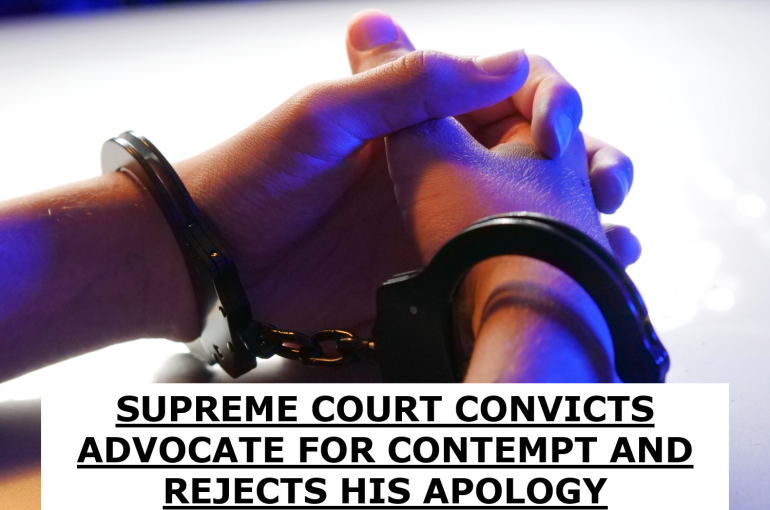SUPREME COURT CONVICTS ADVOCATE FOR CONTEMPT AND REJECTS HIS APOLOGY
A two Judge Bench of Supreme Court comprising of Justice Vikram Nath and Justice Pamidighantam Sri Narasimha, passed a judgement dated 30.01.2024 in Gulshan Bajwa v. Registrar, High Court of Delhi & Anr. Cr. Appeal No. 577/2007 wherein the Apex Court held that in a case of contempt of Court, the apology submitted by the counsel should demonstrate genuine remorse for the acts and must not be employed as a tool to absolve the liability for the offence committed.
Facts
On 17.08.2006, a Writ Petition was filed before the High Court of Delhi by the Appellant who was appearing as a counsel in a case. The Appellant sought an adjournment in the High Court and after the adjournment was granted by the Court, the High Court noticed that the Appellant was giving threats to the lady counsel who was appearing on the behalf of opposite party. The opposite counsel raised her complaint to the Court and the Court requested the Appellant to appear before the Court and passed an order directing him to explain his conduct.
Despite repeated calls by the Hon’ble Court, the Appellant failed to appear before the Court to explain his conduct. The Appellant also sent another counsel to seek adjournment stating that the Appellant was not well. However, a standing counsel of Union of India provided that he had seen the Appellant in the Court premises on the same day.
On the other hand, the Appellant filed an application seeking transfer of the said Writ Petition to a different bench of High Court and made reckless and unsubstantiated allegations against the judges of the High Court. A Show Cause Notice was issued by the Bench to the Appellant asking him to show cause as to why proceedings under the Contempt of Courts Act, 1971 should not be initiated against him.
Even after multiple attempts to call the Appellant in the Court, the Appellant failed to appear before the Court and thus, the High Court issued bailable and then non-bailable warrants against the Appellant. The Appellant still did not appear and ultimately the Hon’ble High Court had to call the Deputy Commissioner of Police, New Delhi to ensure the presence of the Appellant in Court.
On 18.09.2006, the Appellant was produced before the Court and was also released upon furnishing a bail bond. Later, the High Court held that the Appellant was guilty of criminal contempt, citing his use of undesirable language, making wild allegations, and threatening legal professionals.
The High Court concluded that these intentional and malicious acts interfered with the administration of justice, lowering the Court’s dignity. On 19.10.2006, the High Court sentenced the Appellant to 3 months of simple imprisonment and imposed a fine of Rs. 2000 in each contempt proceeding, forming the basis of the Appellant’s Appeal.
Issues
I) Whether there was actual criminal contempt of Court?
II) Whether the order by the High Court was based on biased opinion of the judges?
III) Whether the imprisonment and fine imposed by the High Court was justified?
Decision of Supreme Court
The Supreme Court held that the Appellant, was submitting letters making reckless allegations against the Judges and Indian Judicial System even in the present Appeal in the Supreme Court. Moreover, the Appellant had still not submitted any kind of apology from his end. The Supreme Court reiterated the judicial precedents of M.B. Sanghi, Advocate v. High Court of Punjab & Haryana[1] and Pritam Pal v. High Court of M.P., Jabalpur[2], relied on by the High Court while passing the impugned Order dated 19.10.2006. Further, the Supreme Court highlighted that a contemnor ought to be punished with imprisonment for making libellous and motivated allegations against the Court and its Judges which interfere with the administration of justice.
Moreover, the Apex Court was of the opinion that the High Court was correct in not accepting the apology tendered by the Appellant since it was not bonafide and lacked in sincerity, apart from being belated and a mere ‘lip service’.
Hence, the Hon’ble Supreme Court held that the High Court’s Order requires no interference and the Appellant was rightly convicted for the offence of contempt of Court. The Supreme Court affirmed the finding of conviction, with a modification to the sentence. Considering the Appellant’s age and his claim of medical ailments, the sentence was adjusted from imprisonment of 3 months to imprisonment till the rising of the Court.
Conclusion
The Supreme Court concluded that the conduct of the Appellant constituted a purposeful interference with the administration of justice. The Hon’ble Supreme Court dismissed the Appeal filed by the Appellant and upheld the judgement passed by the High Court of Delhi. However, the Apex Court modified the sentence of the Appellant from 3 months imprisonment to till the rising of the Court. The ruling emphasised how crucial it is to preserve Judicial Officers’ honour and reputation.
Editor’s comments
This case highlights two very important aspects of our legal system. The first is that despite the advocate showing such impunity to the High Court Judges, he was able to get away with a simple punishment. This was because of a delay of 17 years before the matter saw closure. Litigants must be mindful of the fact that litigation in India is protracted and the system does not give speedy redressal even when the case is contempt of High Court Judges.
Arjav Jain
Associate
The Indian Lawyer & Allied Services
Edited By-
Sushila Ram Varma
Chief Consultant
The Indian Lawyer & Allied Services
[1] (1991) 3 SCC 600
[2] 1993 Supp (1) SCC 529





































Leave a Reply